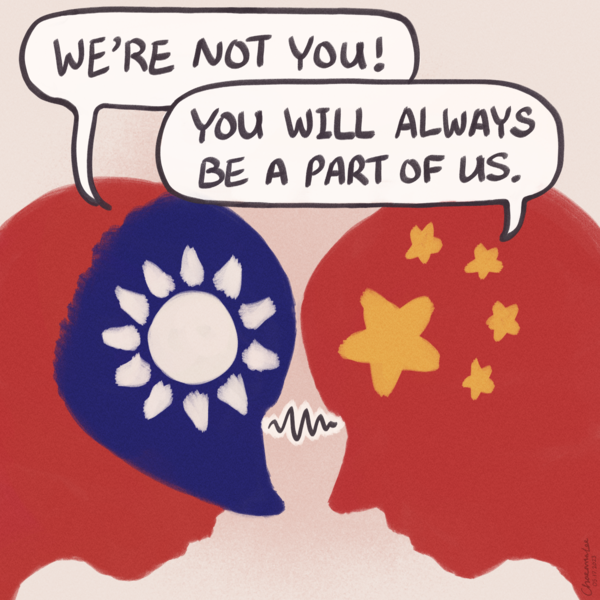Boiling Point: The Strained Relationship Between China and Taiwan
As Taiwan moves toward independence, signs of possible conflict are troubling the Taiwan Strait. In this Debate, we explore the plausibility of military conflict between Taiwan and China occurring in the near future. Will diplomacy prevail, or will we see the oft-predicted open warfare unfold? The two countries are clearly at a critical juncture in history.
There is growing concern in the West and parts of Asia that China may invade Taiwan. Following the visit of Taiwan's President Tsai Ing-wen to the United States on March 29, China conducted military drills in the Taiwan Strait. China's military declared that they are prepared at any time to "smash 'Taiwanese independence' separatism and external meddling in any form."
The military drills come amid worsening US-China relations. China's President Xi Jinping has made it clear that Taiwan belongs to the People's Republic of China, while US President Joe Biden has repeatedly stated that the United States would come to Taiwan's aid in the event of a Chinese attack. The US has been a longstanding ally of Taiwan, providing support for its defense and recognizing its democratic government, but China views such actions as interfering in its domestic affairs. The situation remains complex, and any escalation of tensions could potentially lead to conflict.

However, the risk of imminent Chinese military action against Taiwan is low. It is not unusual for Beijing to showcase its military powers when high-level US and Taiwanese officials meet face-to-face. China's latest response was less threatening than its reaction to former US House Speaker Nancy Pelocy’s visit to Taiwan last summer. Moreover, Xi is unlikely to go against his recent efforts to establish himself as a global peacemaker. China has mediated talks between Iran and Saudi Arabia, leading to a significant improvement to their historically contentious relationship. Xi has also attempted to involve China in the peacemaking of the Russia-Ukraine war. China issued a 12-point peace plan for Ukraine and welcomed French President Emmanuel Macron and European Commission Chairman Ursula Von der Leyen to Beijing for further discussions on the Ukraine war and China's relations with Europe. While Xi did not push Russia to withdraw from Ukraine, China and France issued a joint statement pledging to work together to bring Russian and Ukrainian negotiators to the bargaining table. Von der Leyen recognized that China could play a crucial role in ending the war in Ukraine, and that the European Commission expects that “China will play its role and promote a just peace, one that respects Ukraine’s territorial sovereignty.”
Xi has also realized how costly an ill-conceived war can be, as Russia's President Vladimir Putin demonstrated most recently. China will refrain from attack if only to avoid catastrophic economic consequences. Taiwan, backed by sophisticated and powerful American weapons, has been preparing for a possible Chinese invasion for a long time, and given China's lack of combat experience over the past 44 years, Xi understands the real risks involved. According to a recent war game simulation by Center for Strategic and International Studies, a prominent Washington-based think tank, Chinese invasion of Taiwan would result in enormous costs and devastation, with no clear victory for either side. In most scenarios, the US and Taiwan defeated a conventional invasion by China and maintained an autonomous Taiwan, but lost dozens of ships, hundreds of aircraft, and tens of thousands of servicemembers. However, the US suffered more in the long run in their pyrrhic victory due to the damage to Washington’s global standing.
Considering that China is emerging from the world's most severe lockdown and its worst economic slowdown in decades, Xi is likely to be extra cautious about the fights he picks. China’s reliance on Taiwan’s semiconductor industry is also likely to be a significant factor in any decision-making regarding potential military action. About 90% of the world's most advanced computer chips are made in Taiwan. This creates a significant risk for the global economy if their production were to be dramatically slowed or halted. It would also take years for countries to achieve self-sufficiency in chip production. Meanwhile, the risk works as an incentive for the US to protect Taiwan and deter Chinese invasion.
All that said, it would still be unwise to overlook China's recent military maneuvers, as they carry several risks and implications. They reflect an aggressive political posture, signaling China's assertiveness and willingness to project power in the region. Additionally, these exercises demonstrate a surprising level of military might that even long-time China watchers find impressive. With advancements in hypersonic weapons and artificial intelligence, China's ability to mobilize and coordinate different military components has become evident. As Times columnist Ian Bremmer argued, China may invade Taiwan, but the timing will be determined by their leader, not as the result of any diplomatic provocation. With the rising tensions, it is crucial to strike a balance between supporting Taiwan and avoiding actions that may be perceived as provocations. Leaders must exercise caution and restraint, prioritize diplomacy, and strive towards peaceful coexistence.

